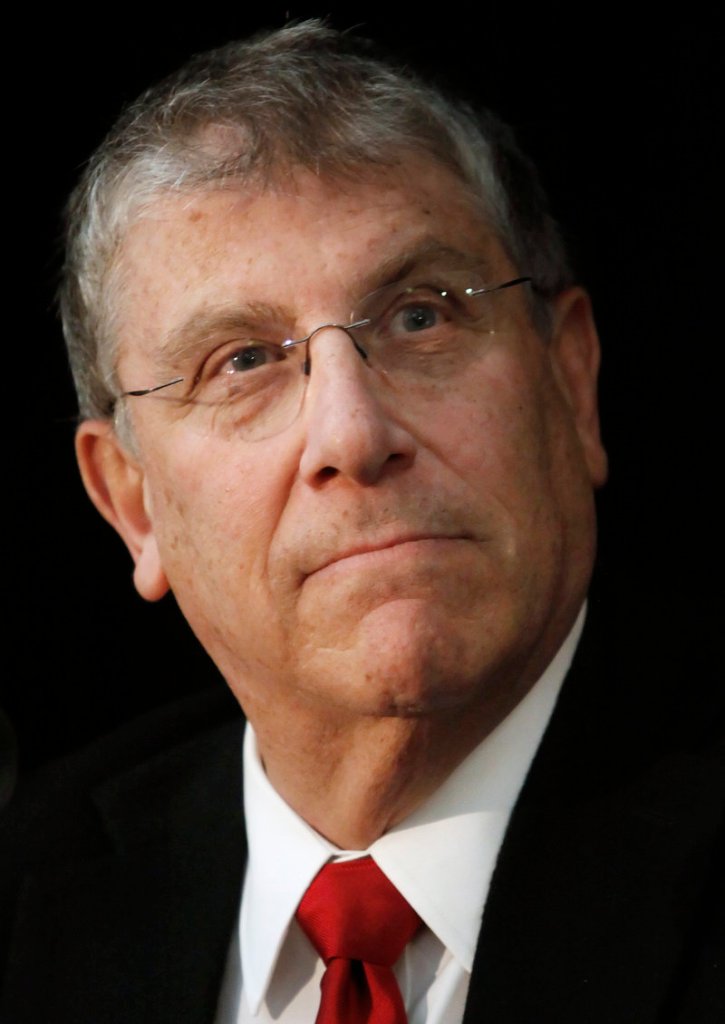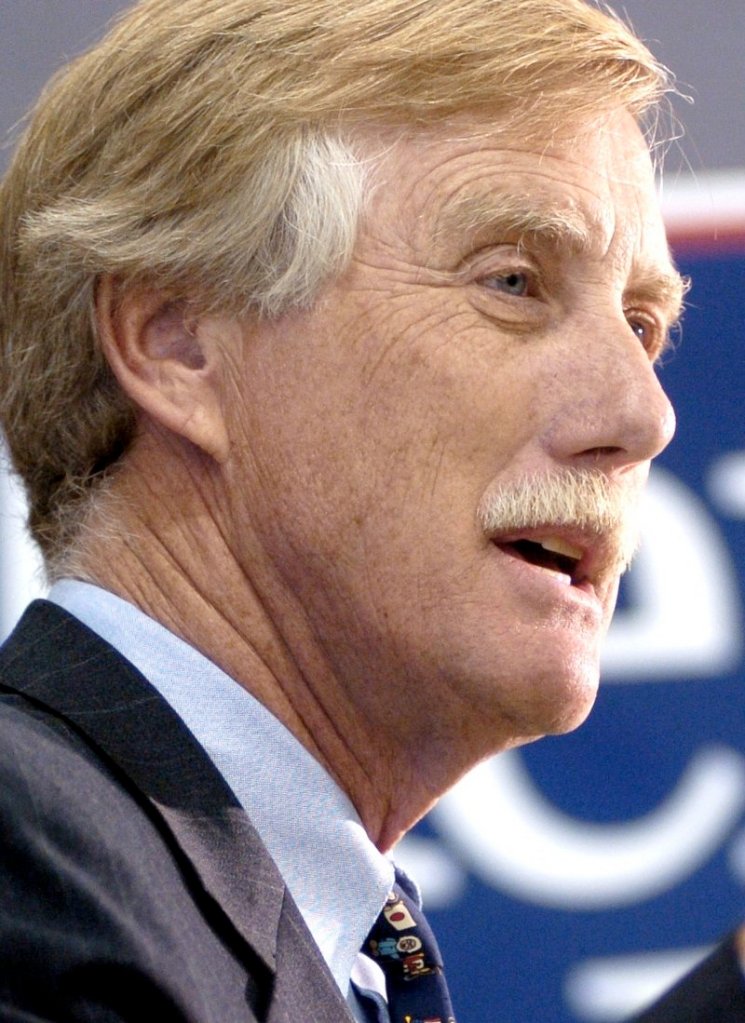It’s primary season in Maine, and all eyes are on the 12 Republicans and Democrats who would be governor.
But what about No. 13?
Eliot Cutler of Cape Elizabeth is running as an unenrolled candidate, also referred to as independent.
There are 10 unenrolled candidates for governor, but only Cutler, at this point, is considered a contender in the November general election. Groups hosting candidate forums have included Cutler in their lineups, and he has a professional staff working on his campaign.
Maine has a track record when it comes to electing independents as governor. Jim Longley Sr. ran and won as an unenrolled candidate in 1974. And Angus King won twice as an independent, serving two terms from 1995 to 2003.
“Maine is at least somewhat unique in terms of being a pretty hospitable environment for independents or third-party candidates,” said Mark Brewer, a University of Maine political scientist, “especially those who have some viability or base to them.”
While voters give major party candidates an official endorsement in the primaries, independents must establish themselves as serious aspirants, said King.
“First and foremost, you have to convince people you’re for real — contributors, supporters, people who you want to have endorse you,” said King, who is not endorsing any candidate. “You’ve got to convince them it’s not a long shot, a fluke.”
Another disadvantage, said King, is that independents don’t have the ready-made structure political parties enjoy, such as town and county committees.
And, said Cutler, there are no party lists of registered voters, no caucuses, no state conventions to tap into.
With a crowded primary field, it can be difficult to get media attention, said Cutler. Many small media outlets aren’t running news about the gubernatorial campaigns, because so many candidates are in the running. At other times, he’s been ignored by reporters who were focused on candidates facing primary elections, he said.
Because the primaries are in June, an independent has four months to catch up to the party candidates, in terms of getting attention, King said.
But independents must still work before, during and after the primaries to have a chance, he said.
“If you’re trying to start from ground zero on June 15th, it’s probably too late to build up the necessary name recognition, to be a realistic contender come November,” said King.
To counter those disadvantages, King began running a full-time campaign in April 1993, a year and a half ahead of the 1994 general election.
He advertised throughout the primaries, as if he were running in one.
“It was enough so my name was out there amongst all the others at the time of the primary,” he said.
And, said King, his campaign concentrated on “being in the hunt” in terms of fundraising.
“We were always either at the top or near the top. The money was handy — but the whole idea was to say to the public and press, ‘This guy’s for real,’” said King.
At the end of the 1994 race, King had spent $1.74 million and received 35.4 percent of the vote. Democrat Joseph Brennan had spent $1.37 million and gotten 33.8 percent, and Republican Susan Collins had spent $585,000, getting 23.1 percent.
Cutler has been working full time on his campaign since last June. He’s out on the stump, having been to every county at least twice. He’s run TV ads, to get his name and face in the public eye. He’s raising and spending money.
According to the latest campaign finance reports, filed in January, Cutler had raised $266,485 and had spent $183,159. Cutler’s treasurer is Robert C.S. Monks, also a board member of and investor in MaineToday Media, which publishes the Portland Press Herald/Maine Sunday Telegram, Kennebec Journal and Waterville Sentinel daily newspapers, the weekly Coastal Journal in Bath and their respective Web sites.
Cutler’s finances are in the mix compared to top party earners and spenders during that period. Republican candidate Les Otten had raised roughly $662,560 as of January, between loans and contributions, and had spent $508,406. Republican Bruce Poliquin had raised about $442,800 and spent $137,264.
Democrat Steven Rowe had raised $250,000 and spent $118,961; Democrat Rosa Scarcelli had raised $243,800 and spent $172,562.
Cutler’s efforts haven’t gone unnoticed. He was invited to the Associated General Contractors of Maine’s annual meeting in January, along with party candidates. Matt Marks, the group’s spokesman, said Cutler was the only unenrolled candidate invited.
“He’s a pretty serious candidate,” said Marks.
Other groups have followed suit. Candidate forums hosted by groups involved in forest resources and the fishing industry both featured Republicans, Democrats and Cutler.
There are nine other unenrolled gubernatorial candidates. As of the January finance filing, only one, Samme Bailey, had raised and spent any money — $1,000 raised, $1,000 spent. Several don’t have Web sites, and overall, they don’t have the organization Cutler has put together.
And they haven’t gotten as much attention.
“It’s a tough row to hoe,” said Cutler, “but I have the biggest tent in the state of Maine.”
As a nonpartisan candidate, he’s aimed squarely at the middle of the voter base. Unenrolled voters in Maine outnumber membership in either party — 366,821 as of last month.
Similarly, he’s not limited in his picks for campaign staffers. His campaign manager is Ted O’Meara, a veteran of numerous campaigns and a former head of the state GOP. One of his media consultants is Tad Devine, who was a senior adviser on the presidential bids of Democrats Al Gore and John Kerry.
One advantage to being an independent, King said, is that you don’t have to go through a bruising primary that can harm a candidate even if he or she wins.
“It’s not like you win and everyone falls into step. There can be hard feelings, bruised egos,” said King. “Your opponents go and sit on their hands.”
And, said King, independent candidates can shape their messages without having to be responsive to special interest groups in either party.
Cutler was a Democrat for most of his life, but he switched to the Republican Party to support Peter Mills in the 2006 GOP gubernatorial primary. As he was considering his own gubernatorial run, people tried to persuade him to run in either primary, Cutler said.
“I thought about it. I didn’t want to do it,” he said. “I couldn’t be as independent as I am, and as I think Maine needs the governor to be.”
Staff Writer Matt Wickenheiser can be contacted at 791-6316 or at:
mwickenheiser@pressherald.com
Copy the Story Link
Send questions/comments to the editors.




Success. Please wait for the page to reload. If the page does not reload within 5 seconds, please refresh the page.
Enter your email and password to access comments.
Hi, to comment on stories you must . This profile is in addition to your subscription and website login.
Already have a commenting profile? .
Invalid username/password.
Please check your email to confirm and complete your registration.
Only subscribers are eligible to post comments. Please subscribe or login first for digital access. Here’s why.
Use the form below to reset your password. When you've submitted your account email, we will send an email with a reset code.